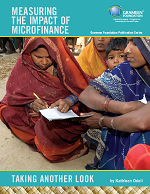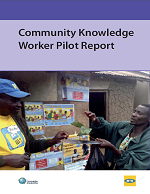MOTECH Lessons Learned
 This document explains our MOTECH project in Ghana and highlights key lessons learned by the project team as the system was being designed, developed and implemented. Although MOTECH is viewed as a “technology project,” the majority of the lessons learned are around operational issues, cultural components and operating with partners to make the project successful.
This document explains our MOTECH project in Ghana and highlights key lessons learned by the project team as the system was being designed, developed and implemented. Although MOTECH is viewed as a “technology project,” the majority of the lessons learned are around operational issues, cultural components and operating with partners to make the project successful.


 In this study, Grameen Foundation reviews microfinance institutions' (MFIs) experiences with mobile financial services and assesses the challenges and opportunities faced during implementation.
In this study, Grameen Foundation reviews microfinance institutions' (MFIs) experiences with mobile financial services and assesses the challenges and opportunities faced during implementation. Most economic development programs that aim to reach the poorest households have not been designed using a sustainable business approach. Instead, these programs have been developed as grants and charity-driven projects. While there is a role for grant-driven programs, organizations can also make sustainable business decisions to extend outreach to poorer populations in the medium to long term.
Most economic development programs that aim to reach the poorest households have not been designed using a sustainable business approach. Instead, these programs have been developed as grants and charity-driven projects. While there is a role for grant-driven programs, organizations can also make sustainable business decisions to extend outreach to poorer populations in the medium to long term. This report examines if and how mobile phones can improve financial literacy amongst the poor. It details the findings from our pilot performed in Uganda from March through December 2010.
This report examines if and how mobile phones can improve financial literacy amongst the poor. It details the findings from our pilot performed in Uganda from March through December 2010. Grameen Foundation’s holistic approach to microsavings provides the framework and tools to develop and offer convenient, accessible, and secure poverty-focused savings programs while building sound financial, organizational, and operational practices that help transform microfinance institutions (MFIs) from credit-led to demand-driven institutions.
Grameen Foundation’s holistic approach to microsavings provides the framework and tools to develop and offer convenient, accessible, and secure poverty-focused savings programs while building sound financial, organizational, and operational practices that help transform microfinance institutions (MFIs) from credit-led to demand-driven institutions. This is not volunteerism for the sake of volunteerism, but rather a new business model for solving some of the real problems impeding the scale, sustainability, and impact of microfinance and T4D initiatives. A greater and more strategic use of volunteers can help the field to realize, more rapidly, strategic and operational improvements.
This is not volunteerism for the sake of volunteerism, but rather a new business model for solving some of the real problems impeding the scale, sustainability, and impact of microfinance and T4D initiatives. A greater and more strategic use of volunteers can help the field to realize, more rapidly, strategic and operational improvements. In Measuring the Impact of Microfinance: Taking Another Look, Odell examines studies which have demonstrated that microfinance helps poor people better cope with financial shocks that often upend their lives. It also addresses the difficulties in isolating microfinance’s impact from the myriad forces at play in poor people’s lives.
In Measuring the Impact of Microfinance: Taking Another Look, Odell examines studies which have demonstrated that microfinance helps poor people better cope with financial shocks that often upend their lives. It also addresses the difficulties in isolating microfinance’s impact from the myriad forces at play in poor people’s lives. Grameen Foundation’s Community Knowledge Worker Initiative is based on the belief that a distributed network of intermediaries, or Community Knowledge Workers (CKWs), can use mobile devices to collect and disseminate information to improve the livelihoods of smallholder farmers.
Grameen Foundation’s Community Knowledge Worker Initiative is based on the belief that a distributed network of intermediaries, or Community Knowledge Workers (CKWs), can use mobile devices to collect and disseminate information to improve the livelihoods of smallholder farmers.